Diversity

It has been a tough go for the church in the United States over the past couple months. The name calling, division, and posturing reached a deafening volume last week in the wake of the World Vision controversy around employing those in gay marriage.
Noise.
Massive amounts of energy poured into proving our “rightness” and your “wrongness.”
Relationships severed. Most without ever having created the space to share a meal and simply listen to one another.
Social media. Interviews. Articles. Press releases.
Noise.
There have been so many chiming in on this thing that I saw no need to jump in and, well, to be honest, I’ve just been sad. Sad at the failed state of discourse within the church. Sad at the demonization. Sad that hungry kids across the world were losing their access to basic needs to live as a result of our inability to live, love and lead … together.

In an attempt to create unity, World Vision managed to create a hornet’s nest around the issue of same-sex marriage. Its president Rich Stearns openly acknowledges the mistakes the relief organization made while flip-flopping on the issue.
Earlier this week, the World Vision announced that it would allow employees to be in same-sex marriages. Within 48 hours, the $1 billion Christian organization reversed course, saying on Wednesday that it had made a mistake. The backlash illustrated how evangelicals will continue to wrestle with a growing cultural acceptance of same-sex marriage.
In an interview with RNS on Thursday, Stearns suggested that the number of sponsors lost was under but around 5,000. Those who sponsor a child pay $35 each month, so the loss could have tallied up to $2.1 million a year.
Stearns also spoke with RNS on how the decision and its reversal has impacted the organization, the number of staff who have resigned and the regret he has had this week. Some answers have been edited for length and clarity.



It is easy to see that over the coming weeks thousands of evangelicals will withdraw their support from World Vision. And Dr. Moore is absolutely right. As this begins to take place, thousands of children will suffer because of the lack of funding from their former sponsors who decided that this theological and political issue was more important than their life. It is a sad day when followers of Jesus Christ will chose to make a theological/political point by withholding funds from children in life-and-death situations.
It is indeed a sad day for evangelicalism. It is sad because we have willingly put on blinders to hide our eyes from the truth of the words of our Lord Jesus Christ. We have chosen to ignore the entire example of his life and the bulk of his teachings and instead pick up our weapons and engage in culture wars instead of working to love God and love our neighbors as ourselves, which, by the way, sums up all of the biblical laws. We have chosen to ignore Jesus’ harsh words to the Pharisees who valued doctrinal rightness over the sacrifice of justice that God has always called us to.
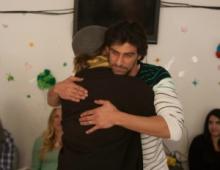
Having just gotten home from guiding another The Global Immersion Project Learning Community deep into the lives of the unheralded heroes in the Holy Land to learn from their often untold stories, I am processing emotions, thoughts, and reflections that will soon bud into a renewed set of practices at home and abroad. I have now been to Israel/Palestine quite a few times, and it would be easy to think the experience becomes mechanical or normal or whatever. Well, for me, that simply hasn’t been the case. We encourage our participants to enter the experience in the posture of a learner rather than a hero. I try to do the same, and in doing so, am continually convicted, challenged, and inspired by our remarkable friends and peacemakers embedded within this conflict.
Here are 7 learnings that have risen to the surface since landing back on home soil:
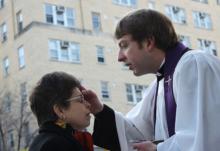
I’ll just say it: I thought “ashes to go” was a great idea.
Thousands of clergy and lay liturgists did “to-go” this year. From all evidence, it was a great hit.
Not everyone appreciated the innovation, of course. But then not every Christian appreciates a liberation-minded pope, or songs on projection screens, or preachers in jeans, or services at any time other than Sunday morning, or ditching denominational hymnals, or coffeehouses doubling as worship venues.
What does it take to educate and parent African-American children, all while maintaining family values?
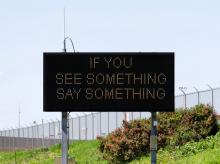
We clearly live in a world that is filled with risks and dangers, and because the increased availability of modern technology allows for harm to occur at unprecedented rates and levels, one can argue that we live in one of the most treacherous eras of human history. However, while the need for protection from harm is both natural and commendable, we are forced to consider whether protection itself can eventually become harmful, unnatural, and even condemnable. In other words, with such extensive resources invested in the pursuit of safety and security, one is forced to consider: What are the consequences of such “protection?" And what happens when so much time and effort is dedicated toward protecting ourselves from our neighbors that we eventually lose sight of who are neighbors actually are? At what point does the heightened priority of protection lead to the increased inevitability of isolation and ignorance? And finally, in our efforts to build impenetrable walls of protection (often in the name of freedom), do we not eventually incarcerate ourselves from the rest of the world and thus limit what it actually means to live free?

I have a vivid memory of my first visit to Sing Sing Correctional Facility in upstate New York. Some young inmates were reading my book, The Soul of Politics, as part of a seminary program in the infamous prison, and they invited me to come discuss it with them. The warden gave me and about 50 young men several hours together, and I will never forget the comment one of them made: "Jim, most of us here are from just five or six neighborhoods in New York City. It's like a train that starts in my neighborhood, and you get on when you are 9 or 10 years old.
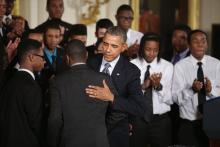
I have a vivid memory of my first visit to Sing Sing Correctional Facility in upstate New York. Some young inmates were reading my book, The Soul of Politics, as part of a seminary program in the infamous prison, and they invited me to come discuss it with them. The warden gave me and about 50 young men several hours together, and I will never forget the comment one of them made: “Jim, most of us here are from just five or six neighborhoods in New York City. It’s like a train that starts in my neighborhood, and you get on when you are 9 or 10 years old. The train ends up here at Sing Sing.” But then he said, “Some of us have been converted, and when we get out, we’re going to go back and stop that train.”
That’s exactly what President Obama’s launch of “My Brother’s Keeper” is calling us to do: to stop the train that is taking young men of color from broken economies, schools, families, and lives into despair, anger, disengagement, trouble, violence, crime, prison, and even death at an early age. This is an urgent and long-overdue moral call that must supersede all our political differences.
While the president’s agenda has always included goals intended to help all Americans, this launch was painfully, powerfully, and prophetically specific.

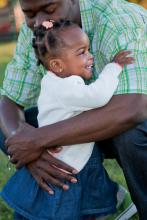
NEARLY 50 YEARS ago, the U.S. Department of Labor issued one of the most controversial and influential reports of our time, “The Negro Family: The Case for National Action,” aka “The Moynihan Report,” named after its author Daniel Patrick Moynihan. The March 1965 report offered our nation’s first comprehensive look at the roots of poverty in the African-American community 100 years after the Civil War. The picture wasn’t pretty.
Pointing to black poverty’s roots, Moynihan started with the hell that was the U.S. slave system: “American slavery was profoundly different from, and in its lasting effects on individuals and their children, indescribably worse than, any recorded servitude, ancient or modern.” Going on to quote Nathan Glazer, Moynihan illuminated the absolute powerlessness and dehumanization of enslaved black people under antebellum law and within the social structures of slavery.
Moynihan went on to examine the impact of the Reconstruction period, urbanization, unemployment, and inequitable wages on African Americans’ economic station in U.S. society. He concluded that the single greatest result of these forces was black families’ demise. And the single greatest result of this demise was entrenched poverty, according to Moynihan.
A 2013 Urban Institute report, “The Moynihan Report Revisited,” reflected that in the early 1960s Moynihan was alarmed that 20 percent of black children lived in single parent households with their mothers (not their fathers), but by 2010, 20 percent of white families lived in such households while 53 percent of black children were being raised by their mothers. According to the Urban Institute, fatherlessness in the U.S. has gotten worse, and it is no respecter of race.

I have great respect for religion writer Jonathan Merritt, even though we disagree on a lot of social and theological issues. He evoked a maelstrom about his article suggesting the Arizona law allowing businesses to deny service to LGBTQ people was less than Christian, and yet he stands behind his words.
Basically, many prominent voices from the Baptist and Neo-Calvinist camps went berserk about his call for tolerance; never mind that he didn’t even take on the moral issues surrounding LGBTQ identity itself. It was simply enough that he called for equal treatment of all people as fellow human beings, period. But he broke rank with the conservative Christian rank-and-file, which depends heavily on uniformity of voice and position on key issues.
Merritt took a risk, knowing full well that he’d likely suffer for it. And he did. In a small online forum of fellow religion writers, he expressed dismay both at the aggressive, hateful nature of peoples’ response from the right, as well as the relative palpable silence from the center and left.
For that, to the degree that I can speak for myself and others like me, I’m sorry, Jonathan. When someone steps out like this, putting himself at risk, we should rally to support him, as much as those on the right rally behind causes.

In the Khayelitsha township near Cape Town, Baphumelele Respite Care Centre and Clinic serves abandoned children as well as ill adults. The staff faces daily the anguish of caring for babies and older children with serious congenital alcohol and drug syndrome or HIV/AIDS complications. A compassionate professional team and scores of volunteers provide education and rehabilitative residential care for countless patients and support to child headed homes.
A nurse friend on the staff gave witness to the disparity between day-to-day realities when faced with the inadequate response by government and societal leaders. It is stunningly the case in South Africa in the post-Mandela era. The clinic was started in 1989 by the local founding-director Rosealia Mashale, “Rosie,” who could not abandon vulnerable children to the trash heap.
Even with more than 25 similar agencies active in the sprawling location of mostly substandard housing and services there are thousands still in need.
Professor Jonathan Jansen, a trusted commentator in South Africa and author of We Need to Act, reminds citizens to leave their comfort zones and contribute to righting the wrongs of society



Arizona has been in the news because of an attempt to get a law on the books that would give Christian business owners the right to refuse products or services on religious grounds. Many commentators feared it would create a right to discriminate against the LGBTQ community. A robust debate has ensued around the question of whether it is Christian to refuse service for any reason or more Christian to serve everyone without qualification. It’s a good debate and it has revolved around the interpretation of certain Biblical texts – the so-called “clobber texts” and whether they condemn homosexual behavior; the call to be neighborly and love our enemies and whether that includes a bit of tough love now and then. My view was well explained by Benjamin Corey – I’m on the love everyone, no exceptions side of this debate with Ben. To my way of thinking, the law was very un-Christian and I’m glad that Gov. Jan Brewer refused to sign it .
But despite Ben Corey’s eloquence and my agreement with him, we didn’t really settle anything. These verbal jousting matches about whose interpretation of Christianity is more true, important as they are, don’t go deep enough. I’d like to introduce a historical element by looking closely at what religion is and how it has functioned in human history. The question I want to ask is not whether it’s Christian to exclude someone but whether it is religious. I’d like to make the case that the answer is yes, it is religious, and propose that Christianity, and any religion that emphasizes the unity of humanity over our differences, is therefore not a religion like other religions. Christianity is therefore more radical than most of its adherents realize.

“Never in my life has my very faith been called into question like this.”
That’s what young evangelical writer Jonathan Merritt told me this week. His statement followed a media firestorm, ignited when both he and Kirsten Powers, weighed in on proposed laws in Kansas and Arizona that would have allowed business owners to deny service to gay couples, based on conservative religious beliefs about homosexuality. Merritt and Powers each suggested that justifying legal discrimination against gay and lesbian couples might not be the best form of Christian outreach and raised consistency issues of whether discrimination would also be applied to other less than “biblical” marriages, or if just gays and lesbians were being singled out.
Their columns in both the Religion News Service and the Daily Beast have provoked intense responses from many Southern Baptists (where Merritt has his own heritage), those who call themselves Neo or “New” Calvinists, and other assorted critics from the political right.
Neither Merritt nor Powers took clear theological positions on all the sexuality issues involved. But both have been stunned by the responses from emails, tweets, and angry phone calls. The 1,200 Twitter notifications, messages, and calls from “leaders” that Merritt has received in the last few days include, “You only pretend to worship Jesus.” “You’re not a Christian.” “You are the enemies of Christianity.” “You’re marginalized now.” “You’re damaged goods.” “You’re on the outs now.”
Merritt and Powers were not questioning the gospel; they were “just asking whether we should discriminate against a whole group of people.” Both columnists believe Christians can honestly disagree on these complicated questions surrounding sexuality, but wanted to raise a discussion about whether passing laws that discriminate based on one religious point of view was wise, especially in this rapidly changing culture.

I hate the phrase, “Love the sinner; hate the sin.”
To be clear, I don’t deny that God hates sin, or that it has dire consequences, or that it exists, or that everyone does it, or that it’s the reason Christ had to come to earth and be crucified in the flesh. I affirm these beliefs. They are not the reason I hate “Love the sinner; hate the sin.”
I hate the phrase because I think it’s a totally screwed-up, backwards, un-Christlike, and unbiblical way to approach ministry and the world in general.
It may be a corrupted bastardization of “Cum dilectione hominum et odio vitiorum,” a quote from a letter by Augustine of Hippo that can be roughly translated as “With love for mankind and hatred for sin.” I have fewer problems with that construction; unlike its modern-day successor, it does not create a subtle but virtually insurmountable divide between speaker and those spoken of.